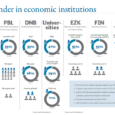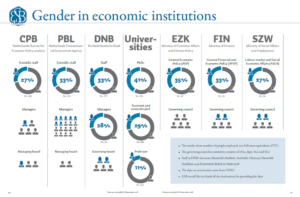At first sight, the gender imbalance in academia seems weird. Discrimination and prejudices are usually of less influence when a performance can be objectively measured. Academia is furthermore characterized by a freedom of where and when to work, which makes it attractive for a work-life balance. So …?
Women in economics
Why is this article in English?
This article is part of our English publication ‘Women in Economics’. This dossier is in English because English is the main language of the economics and business faculties in the Netherlands, so an ESB dossier about the people who work there should be in English.

On second thought however, one can think of three factors obstructing women’s academic careers: academic job characteristics, psychology and policy. Some are particularly salient in the Netherlands, others in economics.
To be successful as an academic requires making long hours and a willingness to travel abroad (and staying there for longer periods of time). Although academics divide their time between teaching, administration and research, career outcomes are almost exclusively determined by research results. For a researcher who spends thirty hours on teaching and admin, being able to spend sixty instead of forty hours a week on the job will result in 3 times as much research time, not 1.5 times as much. This outcome will prove a significant boost to one’s career. As women are still the primary caretakers of the children in most Dutch households, both making long hours and travelling is more difficult for them than for men.
Women do not like competitive environments and do not thrive in them, which is evidently the case in academia. As noted by several contributors to this special issue, economics seems to offer an even harsher competitive atmosphere than other fields. Economists are proponents of “revealed preferences and dislikes”, and are eager to reveal them bluntly. Young women often have less self-confidence than men and research shows that “pervasive cultural associations link men, but not women, with raw intellectual brilliance” (Leslie et al., 2015). Moreover, the stereotype of the successful professor is male too, making women rather ‘suspect’ in these fields – among themselves as well as among their male colleagues. So, female role models matter, especially in male-dominated environments (Rocha and Van Praag, 2017). These psychological gender differences do not help women in their academic economics careers.
Policy measures often have unfortunate outcomes. The few female economists who are invited for the many committees, internal and external, are there because female representation is deemed important. Besides, female workers are less inclined to reject such offers, in order to show good citizenship (Vesterlund et al., 2015). Hence, we are disproportionally busy with tasks that do not promote our careers. Another seemingly positive policy measure is to make promotions easier for female academics than they are for males. However, this doesn’t help us to be taken seriously by our male colleagues (or by one another).
When younger, I sometimes felt misunderstood, underestimated and miserable, or excluded by my peers from social events, soccer in particular. However, I don’t know what the conterfactual is like and am pretty sure that everybody has these feelings, so let’s not be oversensitive. I am also quite convinced that my gender has helped me to get fantastic roles in society. I have been a role model for younger women by helping them to build up their self-confidence and other things. I never had such a role model myself, and am happy to serve as one for many female economists to come. For me, it is really great fun.
References
Rocha, V. and M.C. van Praag (2016) The ‘entrepreneurial boss effect on employees’ future entrepreneurship choices: a role model story? IZA Discussion Paper, 10104.
Leslie, S.-J., A. Cimpian, M. Meyer and E. Freeland (2015) Expectations of brilliance underlie gender distributions across academic disciplines. Science, 347(6219), 262–265.
Vesterlund, L., L. Babcock and L. Weingart (2015) Breaking the glass ceiling with ‘no’. Paper available at www.pitt.edu.
Auteur
Categorieën









